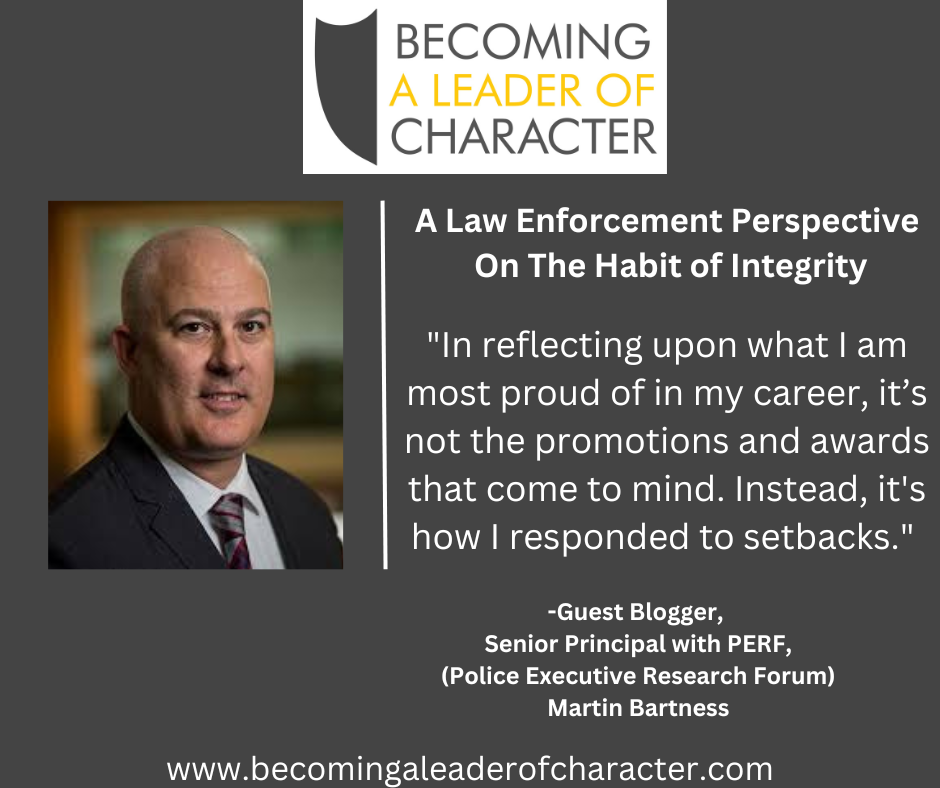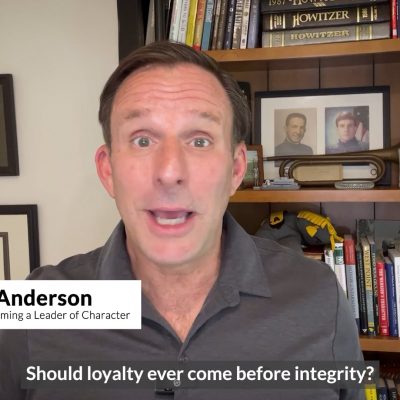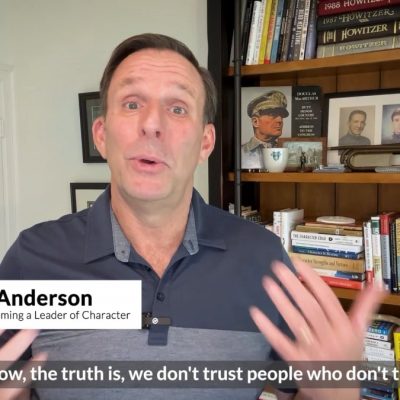Just over a year ago, I retired from the Baltimore Police Department, where I had served as a police officer for 25 years. In reflecting upon what I am most proud of in my career, it’s not the promotions and awards that come to mind. Instead, it’s how I responded to setbacks—times when my commitment to Courage, Integrity, Duty, Humility, Positivity, and Selflessness was put to its greatest test.
Two crucibles of my commitment to the Six Habits of Character spelled out in Dave Anderson’s book Becoming a Leader of Character readily come to mind. Six months after becoming a sergeant, my district commander selected me to supervise an operations team. This was a coveted assignment—a position that often served as a springboard to even better opportunities in the department. I was excited to test my management and leadership skills with a team of hard-charging officers tasked with solving some of the most vexing crime problems in one of Baltimore’s most violent neighborhoods. But the opportunity didn’t last; within a few weeks, my lieutenant ousted me from the position.
The lieutenant wanted me to remove an officer from my squad under the pretense of “unsatisfactory performance.” But the officer’s previous supervisors had rated his performance as “excellent,” so I told the lieutenant I wouldn’t agree to remove the officer without first giving him a chance to meet the newly established performance expectations. Providing the officer with this reasonable opportunity was consistent with everything I had learned about management and leadership; transferring him out of the unit because the lieutenant didn’t like him or wanted to “pick [his] own people” was contrary to my workplace ethics and management principles.
In taking this stance, I was worried about ruining my good reputation. But I couldn’t have looked at myself in the mirror if I had acted on my lieutenant’s wishes. Thus, even though he pushed me out of my preferred assignment, I was proud of having the Courage and Selflessness to subordinate my personal fears and professional ambitions to do the right thing for those I supervised. My Duty was to the welfare of my officers, not to my career aspirations.
Far more was at stake when my character was again challenged over a decade later. By 2018, I had served as a commander (captain or major) for seven years when the newly appointed police commissioner demoted me two ranks to lieutenant. “I am going in a different direction,” he told me.
It was a devastating blow. Personal animus and/or internal politics were clearly at the root of the demotion—not disciplinary action, deficient performance, or other just cause. I had served as the chief of staff to the previous police commissioner and as the executive officer to three prior deputy commissioners; my personnel record held leadership awards from local, state, and national organizations. Those things didn’t matter.
In the days leading up to my demotion, the new administration turned off my departmental cell phone, restricted my access to the headquarters building, and removed my computer. It was their way of telling me—and everyone else in the organization—I wasn’t part of their plans. And although they had the right to move forward with their new plans, the way the new administration treated me was humiliating.
How did I respond? It was a common practice among demoted commanders to take medical leave until their retirement or to obtain a doctor’s note that restricted them to administrative duties. But I didn’t want to be associated with a practice that lacked Integrity and betrayed the oath of office. So, after a humbling trip to the department’s quartermaster to swap my major’s uniform for a lieutenant’s, I reported to my new assignment as a patrol shift commander.
When I arrived, I made it a point not to discuss with anyone the circumstances of my demotion or the executives who had orchestrated it. The officers who worked for me deserved better than a leader steeped in bitterness and negativity—traits that destroy platoon morale and mission performance. And frankly, I doubt they cared about my situation beyond fodder for locker room gossip. They had a job to do, and so did I.
I intentionally committed myself to a spirit of Humility and Positivity: I gave my best to every assignment, emanated good cheer, and walked in the quiet confidence that I would rise above the obstacles before me and end my career on a trajectory of success. Everything worked out in the end. Within four months, the police commissioner who demoted me stepped down as part of a criminal investigation. And within 18 months, a new commissioner restored me to the rank of major and later elevated me to lieutenant colonel.
I don’t pretend to have responded to all of life’s challenges in a manner that reflects the Habits of Character, but I am proud of how I handled these two tests of my moral fabric. More than any award, promotion, or other recognition for a job well done, they are the moments I treasure the most.
In my (Dave’s) work with law enforcement across the country I am privileged to meet a lot of people. Martin is a Leader of Character who is always willing to provide insights and guidance in our efforts to bring our Officers of Character curriculum to agencies across the country. He is a person I would want in my foxhole with me and I am honored to call him a friend.
Martin Bartness is a Senior Principal with the Police Executive Research Forum (PERF), a research and policy organization providing management services, technical assistance, and executive-level education to support law enforcement agencies. Prior to joining PERF, Martin served 25 years with the Baltimore Police Department, where he retired as the Deputy Chief of Patrol. He is a graduate of the 73rd Session of the Senior Management Institute for Police, and he holds a BA from Creighton University, MA from the University of Nebraska-Omaha, MCJ from Boston University, and MPH from the Johns Hopkins Bloomberg School of Public Health.
Here is a quick assessment that will take you 5 minutes to figure it out. Nobody will ever see your results but you.
Warning: If you are not going to be honest with yourself this is a worthless assessment.

To take the assessment use the QR code above or go to www.MYCHARACTERTEST.com







